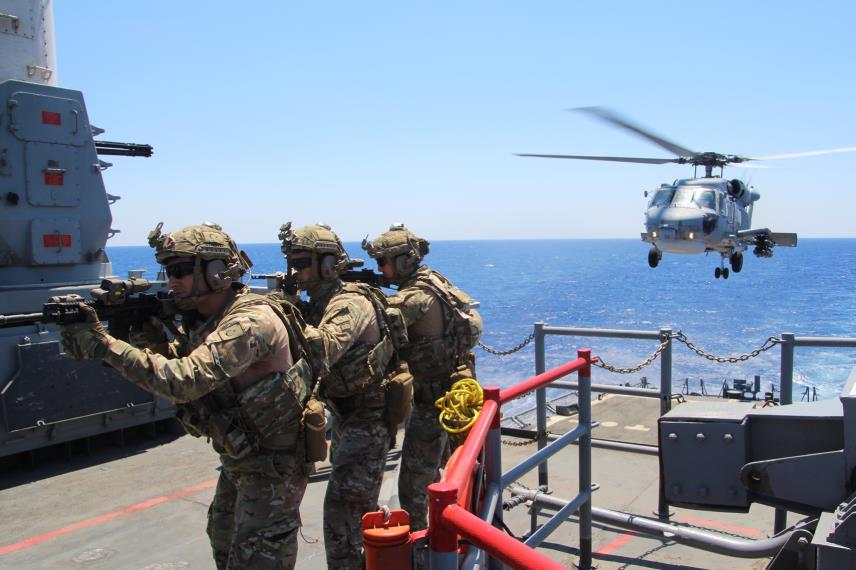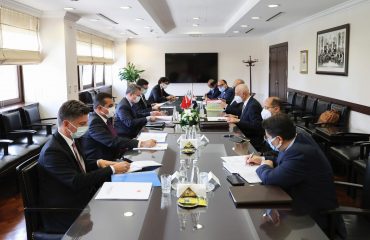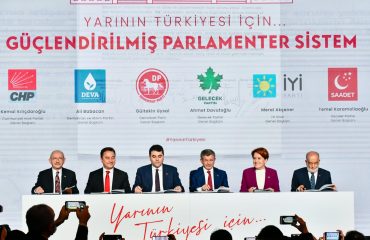

Due to climate change, Springs are getting shorter while summers and winters are extending. It seems that Turkish-Greek relations are also affected by global warming. The warm climate which came after a painful year will not last long. Following the end of summer, as a result of NAVTEXES issued by both parties, the harsh rhetoric used in public statements, the exchange of letters between Permanent Representatives in New York, and the arms race of Greece created an atmosphere of tension. The waters of the Aegean Sea are warming up once again. It is feared that these developments will be followed by the presence of vessels once again in the eastern Mediterranean.
What happened in the last month?
A symposium “Sea of Islands and Neighborhood Relations with Greece“ was held on the 9th of September in İzmir. The symposium was inaugurated by a video message from President Tayyip Erdoğan. The Defense Minister Hulusi Akar, as well as the chief of staff and commanders of all three forces, were among the participants. The discussions were not limited to Aegean questions but varied from illegal migration to support given to terrorism by Greece. Although there was no reaction from the Greek side, the title, timing, and high level of participation must have been noted
On 11th September, Greece announced that she has ordered 6 more Rafale aircraft from France bringing the total to 24. During the visit of Greek PM Kyriakos Mitsotakis to France, a Strategic Partnership agreement in the field of defense and security and a memorandum of understanding for purchasing 3 frigates were signed on September 28. The total of those two projects amounts to 6 billion euros.
On September 30, in his letter sent to UN Secretary-General, Feridun Sinirlioğlu, Turkey’s Permanent Representative to the UN once again registered the objection of Turkey to the militarization of Aegean islands in violation of international treaties. In the letter, it was also underlined for the first time that those militarization efforts will jeopardize the jurisdiction of Greece over the islands.
On October 1, Turkey and Greek Cypriot Administration issued NAVTEXES in the eastern Mediterranean. On the 3rd of October, a Greek Cypriot research vessel was sent away by the Turkish navy from her continental shelf. Finally, Ömer Çelik, spokesperson of the ruling Justice and Development Party (AKP) stated that “the blue land” was an indispensable part of the motherland, and Turkey would be obliged to defend it at any cost.
Among all this fuss, the 63rd round of exploratory talks was held in Ankara. As usual, no statement was issued after the meeting.
Strategic cooperation between Greece and France.
The timing of the strategic cooperation agreement is worthwhile. The agreement comprising of 5 chapters and 31 articles came after less than 2 weeks when Australia announced her decision to buy nuclear submarines from the US instead of diesel-powered ones from France. Germany is busy forming its new coalition; the UK is busy with solving the truck drivers issue, and the US is trying to repair its ties with France. There could have been no better timing.
As far as the content is concerned, there are a lot of words without flesh like cooperation, consultation, exchange of information. The fact that the agreement has been signed by both presidents and foreign ministers is not a common practice in diplomacy. Although in Article 3 the primary responsibility for the security in Europe remained with NATO, there are a lot of references to European Security Identity, which bring to the mind that French experts were more active during the drafting. The most important is Article 2, where it is stated that in case of a mutually agreed aggression to the territory of one side, the parties will assist each other with all available means, including the use of armed forces. This article may be a headache for Greece in NATO.
Debate at the parliament
The agreement was criticized by the opposition during its ratification at the parliament because the wording of Article 2 was vague regarding its coverage, and it did not meet the security requirements of Greece in the Aegean. A member of the ruling New Democracy Party was expelled from the Parliamentary Group of the Party when he claimed that communism was a bigger threat to Greece than Turkey. How lucky the Turks are to be in the first place among the enemies.
The agreement was ratified by 191 votes in the Greek Parliament among 300 MPs. It is doubtful that French soldiers will risk their lives for the sake of “Palikaris”, young Greek soldiers.
Greece is shooting at her own feet
Turkish Defense Minister Akar said on October 8 that “They (some Greek politicians) should know that these are futile efforts and that they cannot defeat Turkey with such actions and discourses.”
There is actually no need to worry about Turkey. If one looks at the military balance published by IISS, it is clear that Greece lacks far behind Turkey in terms of military strength. They were provoked by the Brits when they ventured into the Asia Minor Diasater in 1919. Now they are falling into a trap engineered by France. They have not come out of the economic crises yet. Concerning the ratio of foreign debt to GDP, Greece is still ranking in the first place by 240% among the OECD countries.


